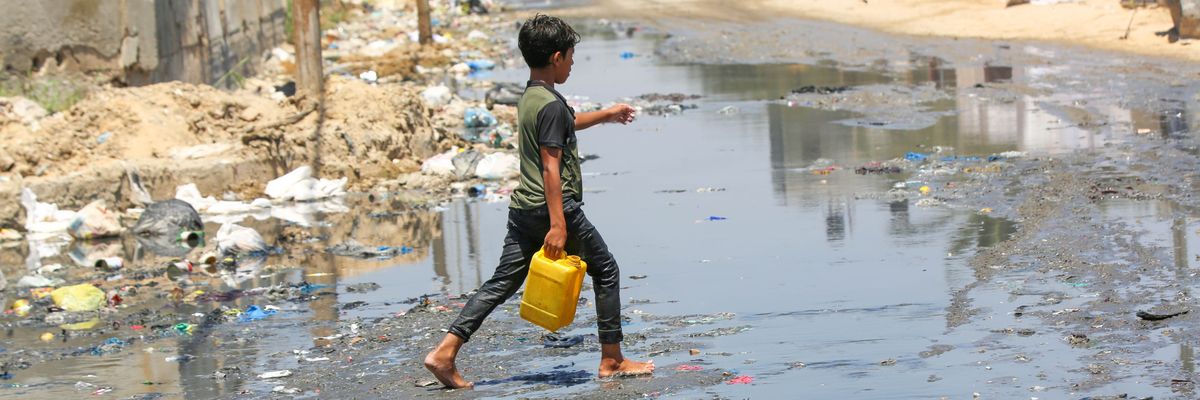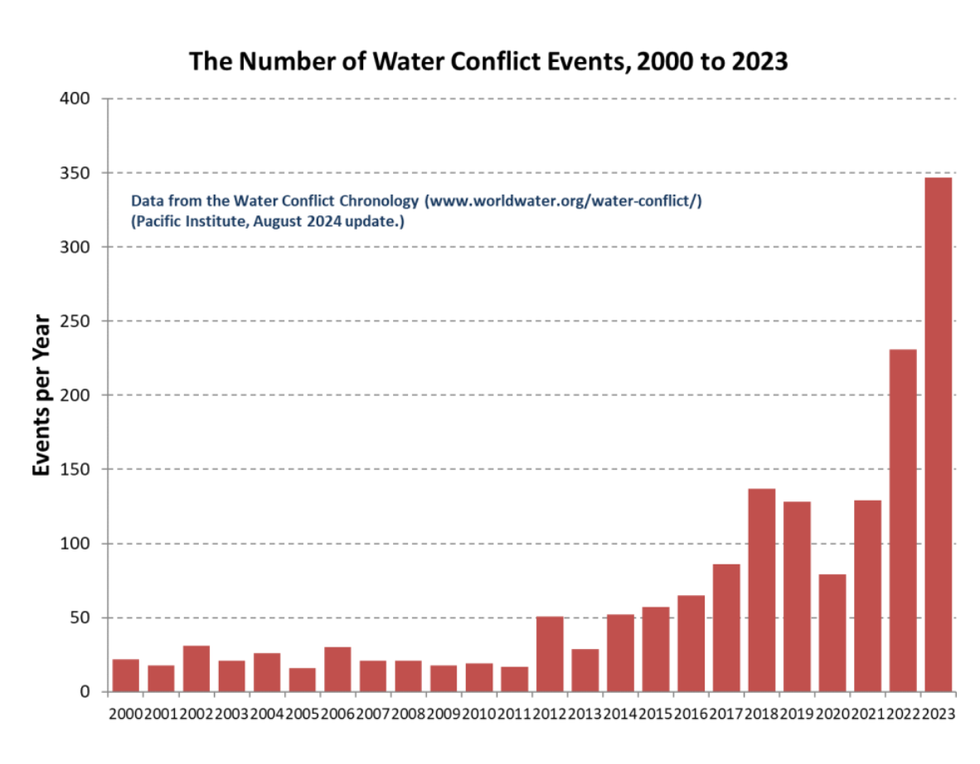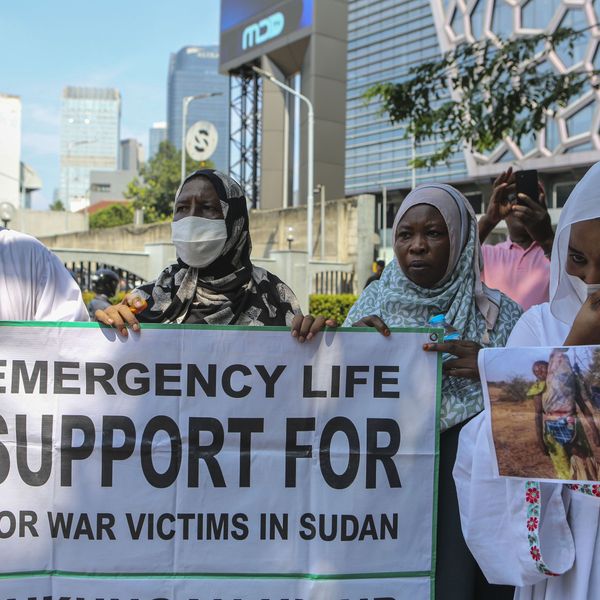
A child goes to get clean water on a street flooded with leaked sewage as sewage treatment plants suspend services due to Israel's attacks and blockade in Deir al Balah, Gaza on July 16, 2024.
Global Water Conflicts Surged in 2023, Fueled by Israeli Attacks
A new report "highlights the devastation that war and violence wreak on civilian populations and essential water infrastructure," said one researcher.
A think tank that tracks water conflicts across the globe reported on Thursday that in 2023, a 50% year-over-year rise in water-related violence was recorded, with Israeli attacks on Palestinian water supplies being a major driver of the surge.
Attacks by Israeli settlers and the Israel Defense Forces on water supplies in the West Bank and Gaza accounted for a quarter of all water-related conflicts last year, reported the Pacific Institute, as the IDF began a full-scale assault and blockade on Gaza in retaliation for a Hamas-led attack on southern Israel in October.
Rights groups have warned for nearly 11 months that Israel's near-total blockade on humanitarian aid and attacks on civil infrastructure were leaving Gaza's 2.3 million people without adequate safe drinking water, causing diseases to spread and intensifying the starvation crisis in the enclave.
The Pacific Institute's annual Water Conflict Chronology quantified those attacks, finding that Israeli settlers and armed forces had contaminated and destroyed water wells and irrigation systems on 90 occasions in 2023.
Cases of water-related violence in Palestine last year included the destruction of 800 meters of water pipelines in the town of Al Awja in the West Bank, cutting off the water supply to agricultural lands; airstrikes on solar panels that provided energy to the Gaza Central Wastewater Treatment Plant, which served 1 million people across 11 communities; and the bombing of at least one desalination plant owned by the Eta Water Company in Gaza.
As in previous years, much of the water-related violence in the West Bank was driven by Israel's illegal annexation of land for settlements, which the International Court of Justice last month ruled violates international law.
"The significant upswing in violence over water resources reflects continuing disputes over control and access to scarce water resources, the importance of water for modern society, growing pressures on water due to population growth and extreme climate change, and ongoing attacks on water systems where war and violence are widespread, especially in the Middle East and Ukraine," said Peter Gleick, senior fellow and co-founder of the Pacific Institute.
With the IDF and Israeli settlers attacking water supplies in Palestine, particularly in the last three months of 2023, water conflicts in the Middle East accounted for 38% of all water-related violence across the globe last year.
"When enforced, international laws of war that protect civilian infrastructure like dams, pipelines, and water-treatment plants can provide essential protections that uphold the basic human right to water."
Gleick said the water conflicts recorded by the Pacific Institute highlight not only "the failure to enforce and respect international law," but also "the failure to provide safe water and sanitation for all and the growing threat of climate change and severe drought."
Latin America and the Caribbean also saw a surge in water conflicts last year, with 48 violent incidents reported compared with 13 in 2022.
The conflicts across the region included clashes between state police and more than 300 residents in Veracruz, Mexico, when the residents were blocking a highway to demand water; an incident in which an armed group opened fire on a convoy of vehicles belonging to the National Directorate of Drinking Water and Sanitation in Ouest, Haiti; and clashes between police and demonstrators in Puebla, Mexico at a protest over the construction of a new water treatment plant, which opponents said would harm local aquifers.
The Pacific Institute said that with drought and the climate crisis contributing to tensions over unequal access to water, "policies can be enacted to more equitably distribute and share water among stakeholders and technology can help to more efficiently use what water is available."
"When enforced, international laws of war that protect civilian infrastructure like dams, pipelines, and water-treatment plants can provide essential protections that uphold the basic human right to water," said the group.
Severe drought in Afghanistan led two families to clash over water distribution in Mahmood Raqi, leaving six people wounded, and drought conditions drove a 15% increase in disputes over access to water for farmland in India last year.
Protests erupted over government decisions to release water from the Cauvery River, with police using force against demonstrators. The Pacific Institute recorded 25 clashes between communities in Tamil Nadu and Karnataka over water resources for irrigation from the river.
The group said the intensifying climate crisis has led to a rapid rise in water-related violence in recent years.
Just 20 water conflicts were documented by the Pacific Institute in 2020, but both of the last two years in particular have shown sharp upticks over the previous years.

"The large increase in these events signals that too little is being done to ensure equitable access to safe and sufficient water and highlights the devastation that war and violence wreak on civilian populations and essential water infrastructure," said Morgan Shimabuku, senior researcher for the Pacific Institute. "The newly updated data and analysis exposes the increasing risk that climate change adds to already fragile political situations by making access to clean water less reliable in areas of conflict around the world."
An Urgent Message From Our Co-Founder
Dear Common Dreams reader, The U.S. is on a fast track to authoritarianism like nothing I've ever seen. Meanwhile, corporate news outlets are utterly capitulating to Trump, twisting their coverage to avoid drawing his ire while lining up to stuff cash in his pockets. That's why I believe that Common Dreams is doing the best and most consequential reporting that we've ever done. Our small but mighty team is a progressive reporting powerhouse, covering the news every day that the corporate media never will. Our mission has always been simple: To inform. To inspire. And to ignite change for the common good. Now here's the key piece that I want all our readers to understand: None of this would be possible without your financial support. That's not just some fundraising cliche. It's the absolute and literal truth. We don't accept corporate advertising and never will. We don't have a paywall because we don't think people should be blocked from critical news based on their ability to pay. Everything we do is funded by the donations of readers like you. Will you donate now to help power the nonprofit, independent reporting of Common Dreams? Thank you for being a vital member of our community. Together, we can keep independent journalism alive when it’s needed most. - Craig Brown, Co-founder |
A think tank that tracks water conflicts across the globe reported on Thursday that in 2023, a 50% year-over-year rise in water-related violence was recorded, with Israeli attacks on Palestinian water supplies being a major driver of the surge.
Attacks by Israeli settlers and the Israel Defense Forces on water supplies in the West Bank and Gaza accounted for a quarter of all water-related conflicts last year, reported the Pacific Institute, as the IDF began a full-scale assault and blockade on Gaza in retaliation for a Hamas-led attack on southern Israel in October.
Rights groups have warned for nearly 11 months that Israel's near-total blockade on humanitarian aid and attacks on civil infrastructure were leaving Gaza's 2.3 million people without adequate safe drinking water, causing diseases to spread and intensifying the starvation crisis in the enclave.
The Pacific Institute's annual Water Conflict Chronology quantified those attacks, finding that Israeli settlers and armed forces had contaminated and destroyed water wells and irrigation systems on 90 occasions in 2023.
Cases of water-related violence in Palestine last year included the destruction of 800 meters of water pipelines in the town of Al Awja in the West Bank, cutting off the water supply to agricultural lands; airstrikes on solar panels that provided energy to the Gaza Central Wastewater Treatment Plant, which served 1 million people across 11 communities; and the bombing of at least one desalination plant owned by the Eta Water Company in Gaza.
As in previous years, much of the water-related violence in the West Bank was driven by Israel's illegal annexation of land for settlements, which the International Court of Justice last month ruled violates international law.
"The significant upswing in violence over water resources reflects continuing disputes over control and access to scarce water resources, the importance of water for modern society, growing pressures on water due to population growth and extreme climate change, and ongoing attacks on water systems where war and violence are widespread, especially in the Middle East and Ukraine," said Peter Gleick, senior fellow and co-founder of the Pacific Institute.
With the IDF and Israeli settlers attacking water supplies in Palestine, particularly in the last three months of 2023, water conflicts in the Middle East accounted for 38% of all water-related violence across the globe last year.
"When enforced, international laws of war that protect civilian infrastructure like dams, pipelines, and water-treatment plants can provide essential protections that uphold the basic human right to water."
Gleick said the water conflicts recorded by the Pacific Institute highlight not only "the failure to enforce and respect international law," but also "the failure to provide safe water and sanitation for all and the growing threat of climate change and severe drought."
Latin America and the Caribbean also saw a surge in water conflicts last year, with 48 violent incidents reported compared with 13 in 2022.
The conflicts across the region included clashes between state police and more than 300 residents in Veracruz, Mexico, when the residents were blocking a highway to demand water; an incident in which an armed group opened fire on a convoy of vehicles belonging to the National Directorate of Drinking Water and Sanitation in Ouest, Haiti; and clashes between police and demonstrators in Puebla, Mexico at a protest over the construction of a new water treatment plant, which opponents said would harm local aquifers.
The Pacific Institute said that with drought and the climate crisis contributing to tensions over unequal access to water, "policies can be enacted to more equitably distribute and share water among stakeholders and technology can help to more efficiently use what water is available."
"When enforced, international laws of war that protect civilian infrastructure like dams, pipelines, and water-treatment plants can provide essential protections that uphold the basic human right to water," said the group.
Severe drought in Afghanistan led two families to clash over water distribution in Mahmood Raqi, leaving six people wounded, and drought conditions drove a 15% increase in disputes over access to water for farmland in India last year.
Protests erupted over government decisions to release water from the Cauvery River, with police using force against demonstrators. The Pacific Institute recorded 25 clashes between communities in Tamil Nadu and Karnataka over water resources for irrigation from the river.
The group said the intensifying climate crisis has led to a rapid rise in water-related violence in recent years.
Just 20 water conflicts were documented by the Pacific Institute in 2020, but both of the last two years in particular have shown sharp upticks over the previous years.

"The large increase in these events signals that too little is being done to ensure equitable access to safe and sufficient water and highlights the devastation that war and violence wreak on civilian populations and essential water infrastructure," said Morgan Shimabuku, senior researcher for the Pacific Institute. "The newly updated data and analysis exposes the increasing risk that climate change adds to already fragile political situations by making access to clean water less reliable in areas of conflict around the world."
- Israeli Blockade of Gaza Causing Contaminated Water, 25% of Illnesses and 12% of Infant Deaths ›
- UNICEF Warns 'Many More Children Will Die' in Gaza Without Safe Water ›
- 'A Massive War Crime': Israel Announces Total Blockade of Gaza Strip ›
- Opinion | When Water Becomes War: The Moral Failure of Global Governance in the Middle East | Common Dreams ›
A think tank that tracks water conflicts across the globe reported on Thursday that in 2023, a 50% year-over-year rise in water-related violence was recorded, with Israeli attacks on Palestinian water supplies being a major driver of the surge.
Attacks by Israeli settlers and the Israel Defense Forces on water supplies in the West Bank and Gaza accounted for a quarter of all water-related conflicts last year, reported the Pacific Institute, as the IDF began a full-scale assault and blockade on Gaza in retaliation for a Hamas-led attack on southern Israel in October.
Rights groups have warned for nearly 11 months that Israel's near-total blockade on humanitarian aid and attacks on civil infrastructure were leaving Gaza's 2.3 million people without adequate safe drinking water, causing diseases to spread and intensifying the starvation crisis in the enclave.
The Pacific Institute's annual Water Conflict Chronology quantified those attacks, finding that Israeli settlers and armed forces had contaminated and destroyed water wells and irrigation systems on 90 occasions in 2023.
Cases of water-related violence in Palestine last year included the destruction of 800 meters of water pipelines in the town of Al Awja in the West Bank, cutting off the water supply to agricultural lands; airstrikes on solar panels that provided energy to the Gaza Central Wastewater Treatment Plant, which served 1 million people across 11 communities; and the bombing of at least one desalination plant owned by the Eta Water Company in Gaza.
As in previous years, much of the water-related violence in the West Bank was driven by Israel's illegal annexation of land for settlements, which the International Court of Justice last month ruled violates international law.
"The significant upswing in violence over water resources reflects continuing disputes over control and access to scarce water resources, the importance of water for modern society, growing pressures on water due to population growth and extreme climate change, and ongoing attacks on water systems where war and violence are widespread, especially in the Middle East and Ukraine," said Peter Gleick, senior fellow and co-founder of the Pacific Institute.
With the IDF and Israeli settlers attacking water supplies in Palestine, particularly in the last three months of 2023, water conflicts in the Middle East accounted for 38% of all water-related violence across the globe last year.
"When enforced, international laws of war that protect civilian infrastructure like dams, pipelines, and water-treatment plants can provide essential protections that uphold the basic human right to water."
Gleick said the water conflicts recorded by the Pacific Institute highlight not only "the failure to enforce and respect international law," but also "the failure to provide safe water and sanitation for all and the growing threat of climate change and severe drought."
Latin America and the Caribbean also saw a surge in water conflicts last year, with 48 violent incidents reported compared with 13 in 2022.
The conflicts across the region included clashes between state police and more than 300 residents in Veracruz, Mexico, when the residents were blocking a highway to demand water; an incident in which an armed group opened fire on a convoy of vehicles belonging to the National Directorate of Drinking Water and Sanitation in Ouest, Haiti; and clashes between police and demonstrators in Puebla, Mexico at a protest over the construction of a new water treatment plant, which opponents said would harm local aquifers.
The Pacific Institute said that with drought and the climate crisis contributing to tensions over unequal access to water, "policies can be enacted to more equitably distribute and share water among stakeholders and technology can help to more efficiently use what water is available."
"When enforced, international laws of war that protect civilian infrastructure like dams, pipelines, and water-treatment plants can provide essential protections that uphold the basic human right to water," said the group.
Severe drought in Afghanistan led two families to clash over water distribution in Mahmood Raqi, leaving six people wounded, and drought conditions drove a 15% increase in disputes over access to water for farmland in India last year.
Protests erupted over government decisions to release water from the Cauvery River, with police using force against demonstrators. The Pacific Institute recorded 25 clashes between communities in Tamil Nadu and Karnataka over water resources for irrigation from the river.
The group said the intensifying climate crisis has led to a rapid rise in water-related violence in recent years.
Just 20 water conflicts were documented by the Pacific Institute in 2020, but both of the last two years in particular have shown sharp upticks over the previous years.

"The large increase in these events signals that too little is being done to ensure equitable access to safe and sufficient water and highlights the devastation that war and violence wreak on civilian populations and essential water infrastructure," said Morgan Shimabuku, senior researcher for the Pacific Institute. "The newly updated data and analysis exposes the increasing risk that climate change adds to already fragile political situations by making access to clean water less reliable in areas of conflict around the world."
- Israeli Blockade of Gaza Causing Contaminated Water, 25% of Illnesses and 12% of Infant Deaths ›
- UNICEF Warns 'Many More Children Will Die' in Gaza Without Safe Water ›
- 'A Massive War Crime': Israel Announces Total Blockade of Gaza Strip ›
- Opinion | When Water Becomes War: The Moral Failure of Global Governance in the Middle East | Common Dreams ›

